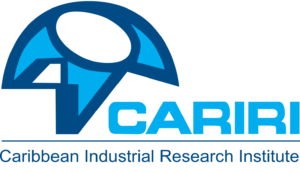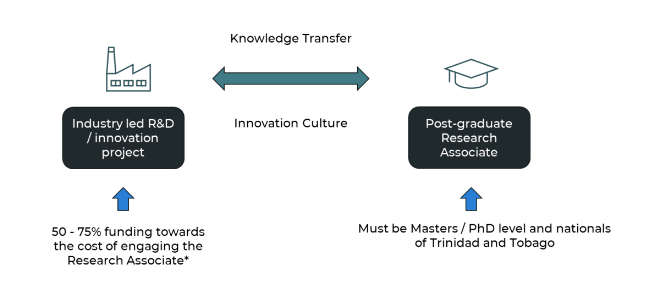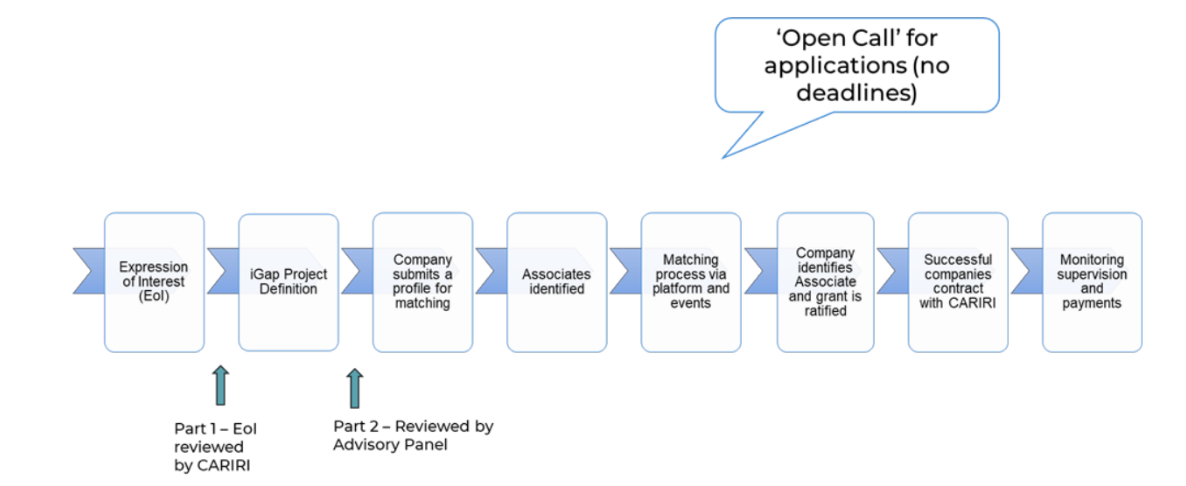Do you need to access talented post-graduates to boost innovation and grow your business
or
Are you a post-graduate looking or an opportunity to contribute to business innovation through doing applied R&D?
About the Industry Academic Linkages Pilot
Building Industry and Academic Linkages is a pilot intervention aimed at supporting business-led innovation by fostering and strengthening links between companies in Trinidad and Tobago and universities through applied research and knowledge development.
It is part of a more extensive programme, Shaping the Future of Innovation (STFOI). It aims to contribute to a diversified economic base in Trinidad and Tobago by developing new markets, products, services, and business models. STFOI is an initiative of the Government of the Republic of Trinidad and Tobago, the European Union (EU) and IDB LAB, the innovation laboratory of the Inter-American Development Bank Group, in collaboration with the Caribbean Industrial Research Institute (CARIRI) as the executing agency. The programme is financed by the European Union and the IDB LAB.
The Building Industry and Academic Linkages Pilot are open to eligible companies seeking to embark upon or actively pursue applied R&D or innovation projects. Under the pilot, they will be allowed to engage a post-graduate research associate for up to six months to bring in new knowledge and expertise.
*SMEs can receive up to 75%, large companies up to 50%.
Some companies may be eligible for R&D tax concessions.
How to apply
Firms and Post-graduate Research Associates interested in Industry and Academic Linkages can access support from Shaping the Future of Innovation to define and develop project ideas. A matching service will also be available to connect suitable firms with Post-graduate Research Associates with the skills and knowledge needed to undertake R&D/ innovative projects.
To register your interest in the pilot programme, contact:
Important Points to Note
The research associate must work on an R&D project or process that meets
our criteria and serves a real business need/market demand.
- STFOI will fund at least 50% of the cost of engaging the research associate. Successful companies will cover the other 50% and any additional costs throughout the R&D process (e.g., consumables, equipment, access to university facilities).
- CARIRI and the participating company will have a contract that outlines the research associate’s obligations.
- The research associate will be supervised by the company and an academic mentor.
Under company taxation provisions, expenditure incurred by companies from engagement in research and development is deductible and an allowance equal to 40% of the actual expenditure incurred, up to a maximum of TT$3,000,000, is available.
Our Application Process
- Interested companies must submit an expression of interest. At this stage, CARIRI will check for the company’s eligibility. Successful applicants will be
referred to CARIRI’s iGap. - The iGap process defines the scope of your innovation project. Between your company and CARIRI, you’ll agree upon the scope and duration of this intervention. Companies will be asked to pay a nominal fee of USD75 (TT$500) per hour for the iGap intervention, typically involving between 3 and 6 hours of work. Following iGap, you’ll fill out Part 2 of the application process for review and assessment by an independent advisory panel.
- Once approved, you’ll be matched with a research associate. To do so, your company will submit a profile of the expertise desired. That way, a suitably qualified research associate can be matched to your needs. Additionally,
member(s) of your company will be invited to matching events hosted by CARIRI and UTT. - Once a suitable research associate has been found, then the project is ratified by the advisory panel, which enables the contract to be initiated with CARIRI
Part 1 of the application is an Expression of Interest which is completed by the company and reviewed by CARIRI. At this stage, an administrative eligibility check will also be done (criteria are detailed on page 7). CARIRI then invites eligible companies to undertake an iGap intervention, where the need and scope of the potential innovative project is defined. Companies must pay a financial contribution towards the cost of the iGap intervention. The indicative cost of
iGap is USD75 (TTD500) per hour with a typical intervention lasting between 1-6 hours depending on:
• Size of the company.
• Number of representatives to speak with.
• If a site visit/tour is included.
• Follow-up actions e.g. meetings/review of documents.
However, companies that have already applied to the Innovation Challenge Facility and have a pre-defined project may be fast-tracked through the process (i.e. they do not undertake an iGap intervention and are invited to complete Part 2 of the application). The output of iGap is a fully defined project with a clear scope, defined activities and requirements, including the profile of the research associate needed for the project. This output forms Part 2 of the application, the Project Definition Form. The full application (Parts 1 and 2) is submitted by the company and then reviewed and scored by an Advisory Panel, who submit recommendations to CARIRI. On approval by CARIRI, successful applicant companies will then enter the matching phase to identify research associates with the skills and knowledge they require, as provided in Part 2 of the application.
Once a suitable research associate has been identified, companies are then invited to submit a detailed cost proposal, the CV of the research associate and the implementation plan for the research project for final ratification. The company will enter into a consultancy agreement with the research associate for a period of up to six months. All information provided by applicants is treated in the strictest of confidence. Please refer to the Shaping the Future of Innovation Privacy Notice for further information
Requirements/Eligibility Criteria for Companies and Graduates/Research Associates
Scope of Building Industry and Academic Linkages
In addition to the administrative eligibility criteria listed in the table above, applications must also meet the following technical requirements, which will be considered during both parts of the assessment process.




